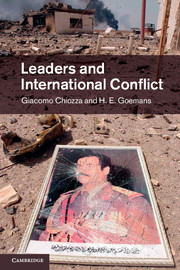Book contents
- Frontmatter
- Contents
- Tables
- Figures
- Acknowledgments
- Online appendices
- 1 Leaders
- 2 Why and when do leaders fight?
- 3 International conflict and the fate of leaders
- 4 The fate of leaders and incentives to fight
- 5 Case studies: Central America 1840???1918
- 6 Conclusions
- Appendix A Data and measurement
- Bibliography
- Index
3 - International conflict and the fate of leaders
Published online by Cambridge University Press: 07 September 2011
- Frontmatter
- Contents
- Tables
- Figures
- Acknowledgments
- Online appendices
- 1 Leaders
- 2 Why and when do leaders fight?
- 3 International conflict and the fate of leaders
- 4 The fate of leaders and incentives to fight
- 5 Case studies: Central America 1840???1918
- 6 Conclusions
- Appendix A Data and measurement
- Bibliography
- Index
Summary
Introduction
“I am reasonably sure of only three things today,” New York Times columnist Anna Quindlen (1991) wrote on March 3, 1991, “that George Bush will be re-elected President in 1992; that if he chooses either Colin Powell or Norman Schwarzkopf as his running mate, he might win by the largest landslide in the history of the nation, and that we are incredibly skilled at war.” These were reasonable claims that many at the time would have shared. In a military campaign that lasted 100 hours and gripped the attention of the American people in front of the television screen, the United States had liberated Kuwait and achieved a decisive victory against the Iraqi Army.
With the benefit of hindsight, we can say that of the three assertions made by Anna Quindlen (ibid.), the last one is undoubtedly true: Americans are indeed quite skilled at war. The second could have been true, but we will never know. The first one ??? the prediction that President George H. W. Bush was going to win re-election easily ??? however, turned out to be false. On election day, November 3, 1992, just twenty months after the victorious conclusion of the Gulf War, President Bush was defeated by Arkansas Governor Bill Clinton by a wide margin: 43% vs. 37% of the popular vote.
- Type
- Chapter
- Information
- Leaders and International Conflict , pp. 46 - 90Publisher: Cambridge University PressPrint publication year: 2011



